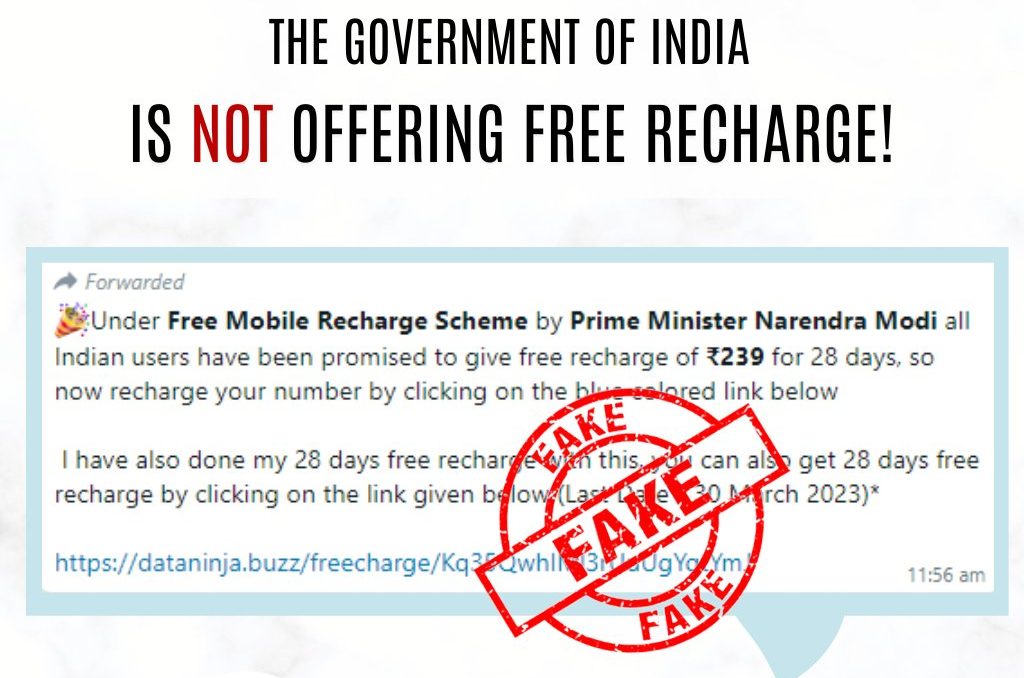As the election season unfurls its vibrant banner across India, the digital realm buzzes with unprecedented enthusiasm. It’s a time when the air is thick with political debates, campaign promises, and the collective anticipation of a nation of a massive 97 crore voters waiting to cast their vote across 10.5 lakh poll stations. Another eye-popping number that usually excites fraudsters is the projected spending of over 1.2 trillion INR or $14.4 billion, equalling the expenditures of the US presidential election of 2020.
Quite naturally, they also develop their version of a darker narrative, in which the scamsters find fertile ground to sow seeds of deception and exploit the enthusiasm that defines the electoral spirit.
The recent “Free Recharge Yojana” incident is quite alarming, as it shows how the bad actors will ignite the excitement of the masses around the election to lure them. For the unintended, last week, a post claiming to offer a free mobile recharge worth 239 INR was doing the rounds across several social platforms. To convince the netizens, the adversaries used the Indian Prime Minister’s photograph in the scam post. The scam went so viral that the Press Information Bureau(PIB) India’s Fact Check twitter handle was compelled to tweet about its authenticity.

The embedded link heads to a blog that retrieves personally identifiable information, including phone numbers, from the victim for further menace.
A similar post featuring the Congress of India’s popular leader also went viral. A horde of innocent people offered their PII data to the scamsters without knowing their outcomes.
The incident is an alarming sign of how the proliferation of scams will do over election buzz to dupe individuals with less adequate cyber hygiene knowledge.
The Dark Underbelly of Election Fever
The phenomenon of election-related scams is not new, but their sophistication grows with each passing election. From phishing attempts and smishing (SMS phishing) to the strategic dissemination of disinformation through spreading fake news and deepfake videos on social platforms, these scams have evolved to tap into the electorate’s heightened emotional state. This emotional manipulation proves the scamsters’ most effective weapon, clouding judgment and leading well-intentioned citizens into their traps.
Why Elections Are a Hotbed for Scams
Elections stir a potent mix of emotions and engagement. They also expand the populace’s digital footprint, offering scamsters perfect camouflage. Genuine election-related content makes fraudulent messages and schemes easy to blend in, challenging their detection. This period of high emotional investment and increased online activity forms the perfect backdrop for scamsters to enact their deceptive plays.
A Glimpse into the Scammer’s Toolbox
The Fake Political Donation Request
A prevalent scam that surfaces during election time involves requests for donations to support a supposed political cause or party. These messages, often crafted with a sense of urgency and patriotic appeal, aim to funnel the goodwill of supporters directly into the pockets of fraudsters.
The Deceptive Poll Survey
Another tactic involves enticing individuals with the promise of rewards for participating in electoral surveys. However, these surveys are phantoms that extract personal information and financial details from gullible victims.
Deciphering the Scammer’s Strategy
Playing on Emotions
Scammers excel in the art of emotional manipulation, crafting messages that resonate deeply with the victim’s political affiliations and patriotic sentiments. This strategy aims to blur rational thought, encouraging actions driven by emotion rather than careful consideration.
Creating an Illusion of Urgency
By suggesting immediate action, scamsters propel their targets into hasty decisions. This sense of urgency is designed to bypass analytical thinking, leading victims straight into the scammer’s snare.
Impersonation and Credibility
Scammers often pose as authoritative bodies or representatives of legitimate entities to lend their schemes an air of credibility. This facade of authenticity makes the deceit more convincing, ensnaring those who might otherwise be wary.
Safeguarding Against Electoral Deceptions
In the vast, interconnected world of digital engagement, vigilance is key. Recognizing the hallmarks of a scam—unsolicited requests for money or information, urgent appeals to emotion, and offers that seem too good to be true—is the first step in the defense arsenal—verifying sources and pausing to reflect before acting can mean the difference between safeguarding one’s digital footprint and falling victim to deception.
We also urge you to install an effective multi-layer protection suite such as K7 Ultimate Security, which incorporates real-time URL scanners, phishing detection, ransomware protection, and more.











